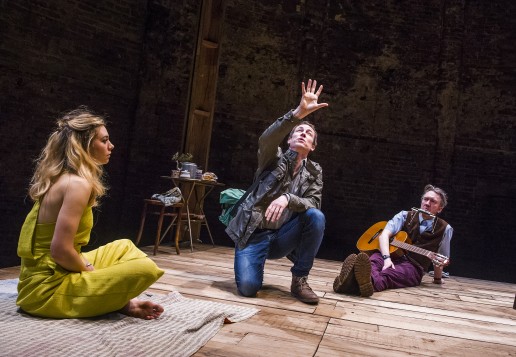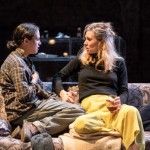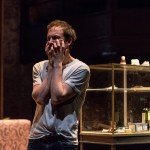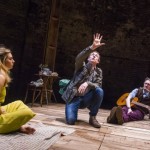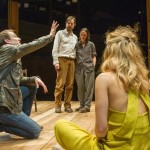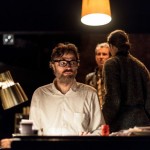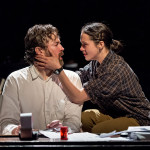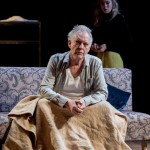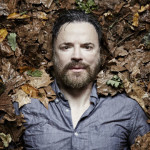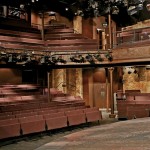Things your life could be:
- A farce
- A tragedy
- Pointless
- All of the above
Things you could do about it:
- Keep living
- Stop living
- Stop someone else living
- Nothing
Even so, what has your life been worth?
Uncle Vanya programme notes, Almeida Theatre
Uncle Vanya is serious and weighty stuff, literally and metaphorically; it is ominous, the lull before the storm. Its atmosphere belies what happens, or doesn’t happen. It’s certainly true that there is a very strong undercurrent of nihilism and misery about 19th Century characters dealing with ennui as if waiting for the Russian Revolution to start and rejecting the complacency of contemporary intellectuals.
Chekhov’s critics, of whom there are many, would argue his work amounts to groups of people sitting around pontificating about life, love, death and the futility of existence while doing almost nothing; meantime, time passes, very slowly and the play meanders… for a very long time.
But there is very greater more depth to Chekhov than this parody would suggest, so the knack for any director is to pick out and highlight the spectrum of emotions and use them to contribute to the greater theme, described thus in 1920 by Storm Jameson: Chekhov’s drama is “not concerned with the facts of everyday life but with life itself, its value and meaning” – enshrined in the questions quoted above from the programme.
Fact is that you can paint Uncle Vanya more ways than one: a Russian potboiler, a Greek tragedy, an allegory for the decline of aristocracy, the threat of poverty, the nature of time and much more besides. Like Shakespeare, as the programme puts it, “there is a universality to Uncle Vanya” – albeit marked largely by smalltalk and dysfunctional relationships.
Robert Icke, rising star of British theatre, takes a new tack on Vanya that Chekhov would at times barely recognise, under the premise that “classics were never meant to be boring.” The translation and adaptation is, shall we say, much freer than you would typically expect. While the bare bones of the plot are very much Vanya, it takes huge liberties with Chekhovian language and goes places you would not expect, for better or worse.
The setting is indeterminate, but not specifically Russian – it could be anywhere. For starters, there is no Vanya, only an Uncle Johnny (a diminutive of Ivan, the Russian version of John.) This is an anglicised Vanya, with Ilya Ilych Telegin translated to a guitar-playing “Cartwright,” more a reflection of his trade. “To leave them in Russian,” the director’s note explains, “would be to make strange that which Chekhov intended ordinary.”
The play is split into four bite-size chunks, possibly an effort to retain accessibility and ensure the audience do not nod off in an emulation of the ennui of several characters. By and large, this daring ploy works brilliantly, and inventively fits the glorious space in the Almeida theatre – of which more to follow.
The effect is fascinating – almost at times how Pinter might have written Vanya, complete with long pauses, characters bouncing off one another, speaking in incongruities and engaged in an unspoken territorial conflict or at least engaged in a deep subtext not featured in the words.
In the first Act they barely say anything yet one can feel the simmering discontent through glances, occasional skirmishes and sudden rants. Each has time, space and opportunity to moan about the woes of their miserable existing, and espousing their desire to change without actually doing anything about it. Unlike Pinter they spell out their views of the human condition directly and with clarity, though that is the writer and translator talking to us.
Talking of words, this adaptation is strewn with f-words more in-keeping with modern drama than the elegant prose of a Russian master – largely but not entirely at the hands of the doctor and principle love interest, Astrov – Mikhail subverted to Michael (Tobias Menzies.) Talking of whom, this mutual attraction between Dr Astrov and (Y)Elena (Vanessa Kirby) becomes a full-blown seduction with clothes hurled in defiance of convention and with a spontaneity decidedly untypical of the slow-moving deliberation seen throughout the evening.
But perhaps the most un-Chekhovian moment comes as, with wilful irony, Michael, Cartwright and “John” launch into drunken choruses of Lust For Life and The Jean Genie, which I’m pretty sure were not a twinkle in their respective writers’ eyes in Chekhov’s day.
We can’t consider this production without taking in the space in which Vanya is performed, the historic Almeida theatre. The curved brick amphitheatre allows auditorium seating to arc around the stage area, a third of the way towards theatre in the round. The square stage is created as a raised platform not unlike a boxing ring without the ropes. At each corner are wooden poles to support the lighting rig above. At the start and end the stage area is veiled by black net drapes, as if it were a four-poster bed.
During the action, the whole assembly rotates slowly to permit the audience different perspectives of the stage, though at times meaning the view is obscured behind a pillar or furniture. Perhaps metaphorically the implication is that we should see from all sides rather than simply through the eyes of any one character, though the practical impact is to complete the theatre-in-the-round panorama.
In addition, characters give us the benefit of their thoughts by leaping off the stage and addressing the audience directly, thus breaking the proverbial fourth wall. Other points of action also take place at ground level, notably at the end as Alexander and Elena make their extended exits and the remainder of the cast remind themselves repeatedly that they are gone.
The set is furnished, but not excessively so – an old sofa, a few other chairs, a table. The use of a perspex drinks cabinet prevents too much of the action being blocked off during revolutions (another apt metaphor.) It does not express personality other than through an air of permanence
Despite the variable impact of modernisation and the set, what makes this such a fizzing production is the acting, as an ensemble and individually. The only moment when it tipped into soapish melodrama was during John/Vanya’s suicidal breakdown after Alexander announces his plan to sell the farm. I like the mannered but subtle performance by Paul Rhys, faintly pathetic in his inability to break through the feeble life he resents badly – though this emotional turmoil turned into an uncharacteristic paranoid rant that stretched the bounds of credibility. This is a shame, since what he says is vital to the outcome: the intelligentsia are deeply respected by the peasantry, but this loyalty is punished. Beyond Chekhov’s lifetime, the sentiments he observed would be avenged.
I heard the mild-mannered professor (Hilton McRae) described as “evil” – as much for his passive-aggressive behaviour as his callous disregard for the feelings of those who manage the farm from which he has derived a modest but consistent living, though to me he seemed thoughtless and careless rather than evil. Credit Mr McRae (Mr Lindsay Duncan!) for providing some depth and ambiguity within the character.
Minor characters (nanny played by Ann Queensberry, John’s arch mother Maria by Susan Wooldridge, complete with raised eyebrow, and Richard Lumsden‘s diffident observer Cartwright) are splendidly realised and performed. The other principle protagonists are the hard-working Sonya (Jessica Brown Findlay), allegedly but not actually plain and dressed for the most part in working dungarees and shapeless shirts, whose love for Dr Astrov is not reciprocated. Sonya finds solace and hope in the day-to-day grind of running of the farm; her vision of hope at the end reminds me of performing Joe in the finale of JB Priestley‘s They Came To A City – a tearful cry for the communist revolution.
This is a powerful performance, worthy of commendation. However, to my mind honours much go to Menzies and Kirby as the would-be lovers, risking the approbation of society’s moral standards. Astrov keeps his love for Elena, second wife of the sickly professor, under wraps, but needs little encouragement once her passion is revealed. It is she who fights her conscience, yearning for the thrill of first love but remembering the need to maintain respectability – which internal debate is a delight to watch.
In totality, this was an absorbing, hypnotic evening’s entertainment – not without flaws but brilliantly combined with a fine reading of the essence of Chekhov’s play to make for a powerful and noteworthy production, one that will live long in my memory. If you were among the critics who assumed nothing happens in Chekhov, think again: hopes are repeatedly dashed but a spark remains. Maybe every life realises its worth some day, and there is no doubt at all in my book: putting off a problem unquestionably makes things worse!

